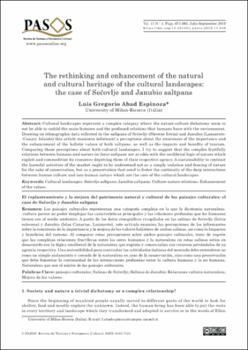The rethinking and enhancement of the natural and cultural heritage of the cultural landscapes: the case of Sečovlje and Janubio saltpans
Fecha
2019Resumen
Cultural landscapes represent a complex category where the nature‑culture dichotomy seem to not be able to unfold the main features and the profound relations that humans have with the environment. Drawing on ethnographic data collected in the saltpans of Sečovlje (Slovene Istria) and Janubio (Lanzarote‑
‑Canary Islands) this article examines informant`s perceptions about the awareness of the importance and the enhancement of the holistic values of both saltpans, as well as the impacts and benefits of tourism. Comparing these perceptions about both cultural landscapes, I try to suggest that the complex fruitfully relations between humans and nature in these saltpans are at odds with the neoliberal logic of nature which exploit and commoditize its resources depriving them of their respective agency. A sustainability to contrast
the harmful activities of the market ought to be understood not as a simply isolation and fencing of nature for the sake of conservation, but as a preservation that need to foster the continuity of the deep interactions between human culture and non‑human nature which are the core of the cultural landscapes. Los paisajes culturales representan una categoría compleja en la que la dicotomía naturaleza‑
‑cultura parece no poder desplegar las características principales y las relaciones profundas que los humanos
tienen con el medio ambiente. A partir de los datos etnográficos recopilados en las salinas de Sečovlje (Istria
eslovena) y Janubio (Islas Canarias, Lanzarote), este artículo examina las percepciones de los informantes
sobre la conciencia de la importancia y la mejora de los valores holísticos de ambas salinas, así como la Impactos
y beneficios del turismo. Al comparar estas percepciones sobre ambos paisajes culturales, trato de sugerir
que las complejas relaciones fructíferas entre los seres humanos y la naturaleza en estas salinas están en
desacuerdo con la lógica neoliberal de la naturaleza que explota y comercializa sus recursos privándolos de su
agencia respectiva. Una sostenibilidad para contrastar las actividades dañinas del mercado debe entenderse no
como un simple aislamiento y cercado de la naturaleza en aras de la conservación, sino como una preservación
que debe fomentar la continuidad de las interacciones profundas entre la cultura humana y la no humana.
Naturaleza que son el núcleo de los paisajes culturales.





